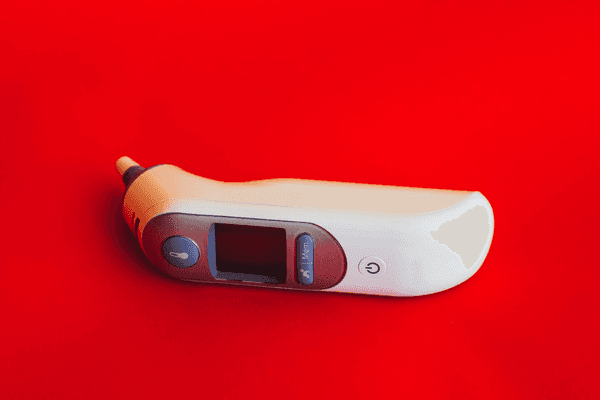![Healthy Matters]() Pharmacist Tips | Dosages | Side effects
Pharmacist Tips | Dosages | Side effects![Healthy Matters]() Nutritionist Tips | Facts | Precautions
Nutritionist Tips | Facts | Precautions![Healthy Matters]() Practitioner Tips | Dosages | Side effects
Practitioner Tips | Dosages | Side effects![Healthy Matters]()
![Healthy Matters]()

Thermometers: How to Tell if You Have a Fever
4 min read

A thermometer is a simple medical device used to measure your body temperature, which is one of the four main vital signs.
Infrared thermometers, glass (ethanol or mercury) thermometers, and digital thermometers: Working principles
There are three main types of thermometers, namely: glass thermometers (mercury or ethanol thermometers), digital thermometers, and infrared thermometers.
| Type of thermometer | How it works | Measurement sites |
| Glass thermometer | The mercury*/ethanol inside expands with higher temperatures. | Oral, rectal or armpit |
| Digital (electronic) thermometer | The resistance of the thermistor (thermal + resistor) varies with the temperature. Negative Temperature Coefficient (NTC) thermistors have less resistance at higher temperatures, while Positive Temperature Coefficient (PTC) thermistors have more resistance at higher temperatures. | Oral, rectal or armpit |
| Infrared thermometer | Measures the thermal radiation (infrared) emitted from the body. A higher level of infrared indicates a higher temperature. | Ear or forehead |
* It is not recommended to use a mercury-in-glass thermometer anymore as mercury is harmful to humans. It could poison you if the thermometer breaks and the mercury is released. It is hazardous to the environment too, so pay extra attention to its disposal. Please refer to the Environmental Protection Department’s guide on recycling mercury thermometers.
Thermometer applications
Checking body temperature
A thermometer is a simple, non-invasive and fast method to monitor body temperature. Elevated or low body temperatures may indicate certain health conditions.
A high body temperature (usually over 38°C or 100.4°F) can indicate:
- Fever: Can be caused by an infection (e.g. COVID-19), medications, certain cancers or severe injuries/traumas, including heart attack or stroke
- Heat exhaustion
- Serious sunburn
- Medical conditions that cause inflammation, such as rheumatoid arthritis
- Metabolic disorders such as hyperthyroidism
A low body temperature (i.e. hypothermia) (usually under 35°C or 95°F) can indicate:
- Overexposure to cold temperatures
- Shock (suddenly passed out, dizzy or unconscious)
- Overindulgence in drugs/alcohol
- Metabolic disorders such as diabetes or hypothyroidism
Tracking ovulation
Thermometers can also be used to track ovulation, helping women who want to conceive to increase their success rates.
The basal body temperature (BBT) is a person's at-rest temperature. You can measure your BBT in the morning before you get out of bed. Because your temperature varies based on the time of day, your physical activity, and the food and beverages you’ve consumed, it is important to measure your body temperature by the same method, at the same time, and under the same conditions each day to obtain a comparable result.
Just before your ovary releases an egg, your body temperature decreases a little. Your temperature then increases 24 hours after the egg is released and remains elevated for several days. A woman's BBT is typically 36.1-36.4°C (97-97.5°F) prior to ovulation. After ovulation, it rises to 36.4-37°C (97.6-98.6°F). Women can track their BBT to find out when they are ovulating.
However, as the body temperature is affected by many other factors, e.g. illness, stress, interrupted sleep cycles, etc, and a woman’s cycle can change, tracking your ovulation alone is not a reliable contraception method.
How to use a thermometer
The directions for using a thermometer depend on its type and the measurement sites, therefore it is best to follow the instructions on the package. Some general directions are listed below.
Using a digital oral thermometer
- Rinse the thermometer in cold water, clean it with alcohol and rinse again before and after using.
- Place the thermometer tip under the tongue and close your mouth while measuring.
- Hold the thermometer in the same spot for about 40 seconds or when the final reading is done (usually indicated by a beep sound).
Using a tympanic (ear) thermometer
- Rinse the thermometer in cold water, clean it with alcohol and rinse again before and after using. Alternatively, use a protective cover and discard it after each measurement.
- Gently pull your ear up and back before putting the thermometer in your ear to open the ear canal and obtain a more accurate result.
- Do not remove the thermometer until the measurement is complete (usually indicated by a beep sound).
What do different temperatures mean?
Normal body temperature
The "normal" body temperature varies from person to person. The normal body temperature for an adult is between 36.1°C (97°F) and 37.2°C (99°F). The range for infants and young children is 36.6°C (97.9°F) to 38°C (100.4°F), which is a little higher.
Body temperature indicating fever
| Core temperature | Surface temperature | ||||
| Measurement sites | Oral | Ear | Rectal | Forehead | Armpit |
| Reference level for fever | > 37.5°C (99.5°F) | > 38°C (100.4°F) | > 38°C (100.4°F) | > 36°C (96.8°F) | > 37.3°C (99.1°F) |
Since surface temperature is more susceptible to changes in the surroundings, it is considered less accurate for gauging body temperature.
Source: Medical Device Division, Department of Health, HKSAR
Where to get a thermometer
In Hong Kong, a thermometer can be purchased from medical device shops, pharmacies, electronic appliances stores and other retail outlets.
For a healthy adult, body temperature can range from 36.1°C (97°F) to 37.2°C (99°F). Babies and children have a slightly higher range of 36.6°C (97.9°F) to 38°C (100.4°F).
It depends on where you take the temperature.
- Oral: > 37.5°C (99.5°F)
- Ear: > 38°C (100.4°F)
- Rectal: > 38°C (100.4°F)
- Forehead: > 36°C (96.8°F)
- Armpit: > 37.3°C (99.1°F)
- Heat exhaustion
- Serious sunburn
- Medical conditions that cause inflammation, such as rheumatoid arthritis
- Metabolic disorders such as hyperthyroidism
This article was independently written by Healthy Matters and is not sponsored. It is informative only and not intended to be a substitute for professional medical advice, diagnosis or treatment. It should not be relied upon for specific medical advice.

Your health resource, made in Hong Kong
Healthy Matters is Hong Kong’s leading health resource. Our mission is to help you make better health decisions and take control of your health.
Our team of experts is committed to producing reliable health content that is accurate, engaging and relevant, to cover your health & wellness journey from prevention to treatment.
Whether you are looking for trusted information on health conditions, wellbeing or looking for the right doctor or service in Hong Kong, we’re here to help!
Your health matters. Begin your health journey with Healthy Matters today!































